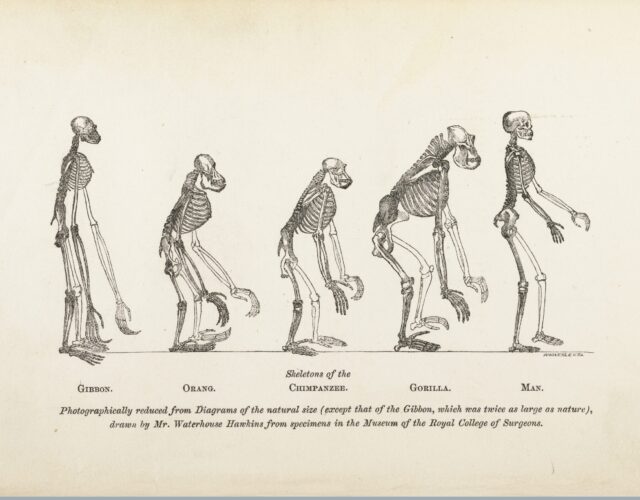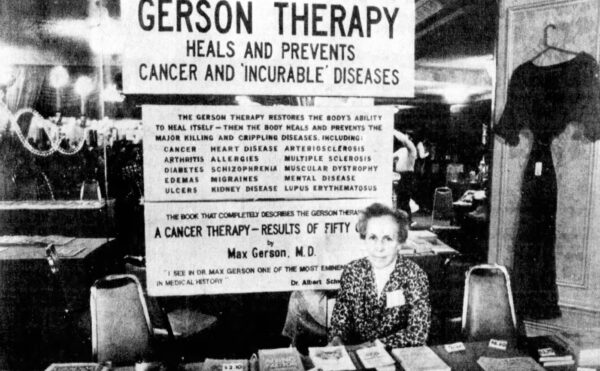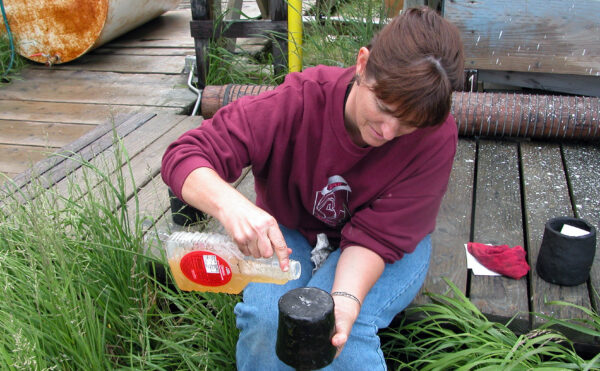Peter J. Bowler. Darwin Deleted: Imagining a World without Darwin. Chicago: University of Chicago Press, 2013. 328 pp. $30.
On the death of Charles Darwin on April 19, 1882, the president of the Royal Society sent a telegram to the dean of Westminster Abbey asking that Darwin be buried in the place where the kings and queens of England had long been crowned and interred with pomp and circumstance. The president wrote that it would be “acceptable to a very large number of our fellow-countrymen of all classes and opinions that our illustrious countryman, Mr. Darwin, should be buried in Westminster Abbey.” And so he was.
Author Peter J. Bowler takes an unusual approach in assessing Darwin’s impact on our world. What if, he asks, Darwin had drowned in 1832 while sailing around the world on the HMS Beagle. There would be no decades of focused research to follow and certainly no On the Origin of Species to shake the world in 1859.
Darwin died a famous man. When we think of evolution, we think of Darwin. All other evolutionary theories have been swept under the carpet of history. The triumph of Darwin’s evolution by natural selection seems inevitable today, a good theory that defeated bad ones. But this wasn’t always the case. Twenty years after Darwin’s death his theory lay on its own deathbed. Few mourned it. Only a handful of scientists believed natural selection to be the driving force of evolution. (Not until the 1930s and 1940s, with the rise of genetics, was Darwin vindicated.)
In the broader cultural sphere the burial of Darwin in Westminster Abbey masked a brewing controversy that affected the traditionally close connections between science and religion.
Until the 19th century there were few alternatives to biblical explanations for the origin of species. The newly recognized depth of geological time combined with the discovery of an ever-increasing variety of fossils turned the origin and development of life into a scientific question. Naturalists, taxonomists, comparative anatomists, paleontologists, and biologists responded with a bewildering variety of theories to explain how new species might arise.
Bowler lays out these theories in detail, but they can be roughly categorized as driven by either internal biological forces or external environmental ones. Darwin was not the only one to champion the environment as the driver for species change: so did Jean-Baptiste Lamarck and Alfred Russel Wallace. If these two remain in the public memory, it’s as the man who believed that a giraffe could acquire a longer neck by reaching for food and then pass that long neck on to its descendants (Lamarck) and the man who codiscovered evolution by natural selection but later went wobbly over spiritualism (Wallace). One of Bowler’s strengths is his refusal to trivialize the impact of the many evolutionary thinkers included in his book (though a casual reader may get lost in the details).
The scope and detail of Darwin’s decades-spanning work made evolution based on natural processes appear irrefutable, but with a caveat. In the 19th century many in Britain and the United States were accustomed to finding parallels between social and scientific laws. Just as the stars were governed by universal laws, so too were societies. Built into the laws governing stars and societies was the 19th-century concept of progressive development. People were primed to find progress wherever they looked. Evolution was no exception.
A telling response to Darwin’s theory of natural selection came from astronomer Sir John Herschel, who described it as the “law of higgledy-piggledy.” Bowler writes that Herschel was “voicing a widespread feeling that so important a process as the development of life on earth could not be explained as merely the sum total of an endless sequence of unpredictable migrations and trivial local adaptation” (p. 126). Even such a friend and strong supporter of Darwin as biologist Thomas Henry Huxley did not believe that natural selection acting on individual variations could be the major driver of evolution. Many Victorians, even religious ones, were willing to accept evolution, as long as it could be linked to quintessentially Victorian ideas of improvement. Natural selection offered only randomness and chance. And without a believable mechanism of inheritance (later provided by genetics), how could natural selection actually work? With these questions unanswered, Darwin’s fame lived on as his theory of natural selection faded in scientific importance.
Scientists instead focused on making sense of the fossil record, where many read into the record a physical progress that matched their understandings of social progress. In the public sphere Darwin’s name and work were quickly put to nonscientific uses. Huxley used them to fight religious influence on science as part of a battle for cultural authority between a professionalizing science and the clergy, some of whom were themselves scientists. Philosopher and liberal thinker Herbert Spencer, who coined the phrase “survival of the fittest,” used Darwin’s work as an analogy for individual and societal self-improvement through struggle. But by the end of the 19th century Victorian faith in progress had faded, and a brutal version of “survival of the fittest” had taken root. Just as the fossil record of life showed some species going nowhere, to many late-Victorian eyes the human record appeared to show some groups stagnating or even degenerating.
What happens when scientific ideas influence how people think about themselves and others? Equally as important, what happens when that thinking in turn affects the scientific ideas in question? As fears of degeneration grew, racism was given scientific justification. In its extreme form it sanctioned separating humanity into superior and inferior species with separate origins. Eugenics had its heyday from the 1910s to 1945, in which a not insignificant segment of scientists and the public believed in improving the human stock through selective encouragement and discouragement of breeding. During the Holocaust that “improvement” took the form of mass murder.
So would our world be different without Darwin, a man who hated slavery, abhorred cruelty to animals, and believed all humans shared a common origin? No, says Bowler, who has no patience for those who blame Darwin and natural selection for the horrors of eugenics and two world wars. Without Darwin other forms of evolution could have as easily been used to justify murderous ideologies. On the other hand, Bowler convincingly argues that without Darwin’s shadow over them, the religiously inclined could have more easily read God’s purpose into evolution.
In the scientific sphere Bowler lays out a convincing case for the independent discovery of natural selection in the early 20th century. By this point in time a whole generation would have grown up familiar with and mostly untroubled by evolution. If Bowler is correct, scientists’ understanding of evolution today would be no different with or without Darwin. A version of the culture wars—exemplified in our Darwinian world by the Scopes Monkey Trial in 1925, the rise of Young Earth creationism after World War II, and more recent efforts to get creationism taught alongside evolution—are likely inevitable, but evolution would not be adding nearly as much fuel to these fires. On a more subtle level Darwin Deleted has implications for the role of science in a wider social context, at least when that science has implications for how we human beings understand ourselves.




